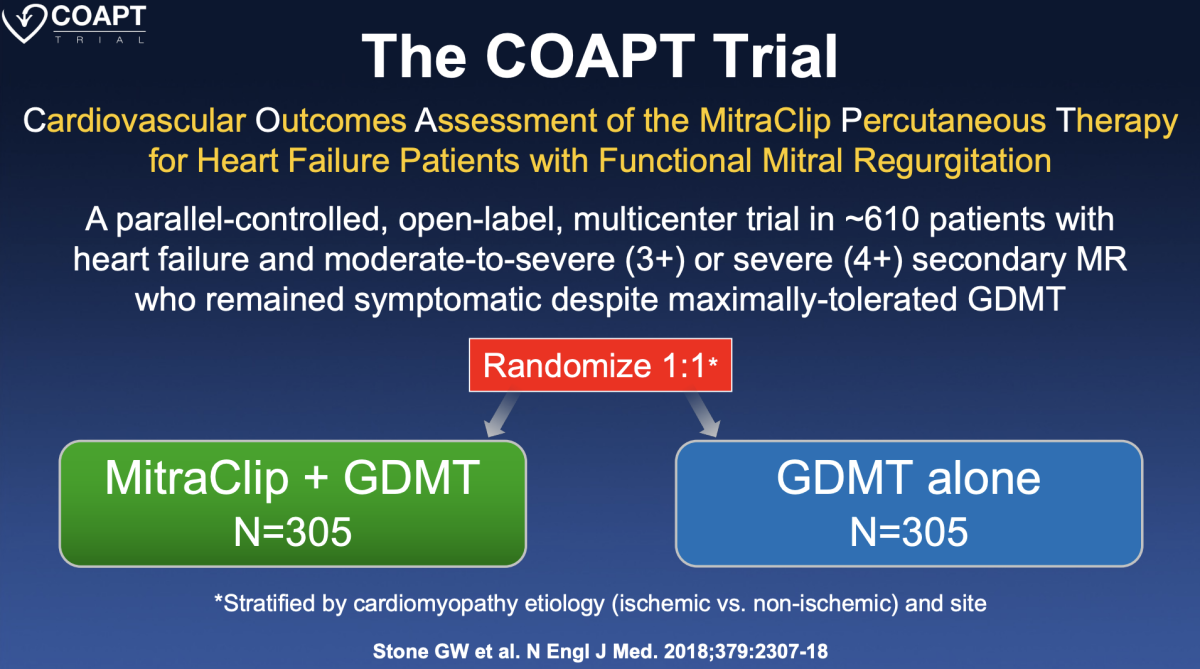
Gregg W. Stone, MD, director of Academic Affairs for the Mount Sinai Health System and professor of Medicine (Cardiology) and Population Health Science and Policy at the Icahn School of Medicine at Mount Sinai
March 5, 2023 — In patients with heart failure and a poorly functioning heart valve, a minimally invasive procedure using a clip to repair the valve was safe, cut the rate of hospitalizations for heart failure by 47% and reduced deaths from any cause by almost 30% after five years of follow-up, according to a study presented at the American College of Cardiology’s Annual Scientific Session Together With the World Congress of Cardiology.
“These final results show that in a very sick population with mitral valve dysfunction secondary to heart failure, transcatheter mitral valve repair was extremely safe and significantly reduced both hospitalizations due to heart failure and deaths from heart failure or all causes,” said Gregg W. Stone, MD, director of Academic Affairs for the Mount Sinai Health System and professor of Medicine (Cardiology) and Population Health Science and Policy at the Icahn School of Medicine at Mount Sinai, and lead author of the study. However, Stone also said these patients had a high rate of adverse events even after successful mitral valve repair, indicating the need for further advances to treat these high-risk patients.

The mitral valve separates the two chambers on the left side of the heart, the left atrium and the left ventricle. The valve controls blood flow from the left atrium to the left ventricle and prevents blood from flowing backward after the heart contracts (this is called mitral regurgitation, or MR). MR is estimated to affect more than 1 in 10 people aged over 75.
Mitral valve regurgitation is most commonly caused by underlying heart failure—specifically, a poorly functioning left ventricle, the heart’s main pumping chamber.
“When the left ventricle becomes enlarged, that in turn deforms the mitral valve so that it no longer closes properly,” Stone said. Mitral valve regurgitation caused by underlying heart failure is known as secondary mitral valve regurgitation
Transcatheter edge-to-edge repair (TEER) is a minimally invasive procedure in which a catheter (a long flexible tube) is used to place one or more clips to bring the mitral valve leaflets together to prevent blood from leaking back into the left atrium. The COAPT trial was designed to determine whether patients with secondary MR would benefit from this procedure using a tiny clip called MitraClip.
The trial enrolled 614 patients (average age 72, 36% women) in the U.S. and Canada who had left ventricular failure, severe MR and symptoms of heart failure (fatigue, breathlessness) despite being on the best available medical therapy, which at the time consisted of three heart failure medications. All patients in the trial continued to take their prescribed heart failure medications. Half of the patients were randomly assigned to undergo a TEER procedure that used MitraClip to reduce MR. The other half, who did not undergo TEER, served as a control group.
The trial’s primary effectiveness endpoint was all hospitalizations for heart failure within two years of follow-up. The primary safety endpoint was whether more than 88% of patients treated with TEER experienced no complications from the device within the first year.
The two-year results, published in the New England Journal of Medicine in 2018, showed a 47% reduced risk of hospitalization for heart failure among patients who received the MitraClip, compared with the control group. The primary and secondary endpoints of the study were met. About 97% of TEER patients had no complications within the first year. Within two years, 29% of TEER patients died from any cause, compared with 46% of patients in the control group.
The current study reports final results for all patients after five years of follow-up. Death or hospitalization for heart failure occurred in 73.6% of patients undergoing TEER compared with 91.5% of those in the control group, a 47% reduction. The reduced risk of death from any cause for TEER patients compared with controls was 28%. The relative benefits of TEER declined after three years, in large part because after two years patients in the control group patients were allowed to “cross over” to undergo TEER.
“MitraClip made a profound difference for patients with heart failure and severe MR. Based on these findings, appropriate patients should be treated with MitraClip as early as possible,” Stone said. “However, nearly 3 in 4 patients still died or were hospitalized for heart failure within five years, even after successful MitraClip, because treating the regurgitant mitral valve does not improve their underlying left ventricular dysfunction. We need to develop better therapies for advanced heart failure if the prognosis of this high-risk patient population is to be further improved.”
One limitation of the study is that it was not blinded, Stone said—that is, both patients and their doctors knew who had undergone the procedure and who had not. However, independent experts assessed the hospitalizations, deaths and other adverse events in the study based on specific criteria documented in the patient’s chart. The study’s findings also apply only to patients with mitral valve regurgitation secondary to left ventricular failure who were treated with the MitraClip device.
Patients enrolled in the COAPT trial received the first-generation MitraClip. Since then, there have been technological advances in the device itself, with the device currently on the market representing the fourth generation of the technology, which can reduce mitral regurgitation further, Stone said. Also, a new class of medications for heart failure known as SGLT2 inhibitors became available in 2020 after the trial was nearly finished.
For more information: www.acc.org
Related Transcatheter Tricuspid Valve Repair Content:
Transcatheter Tricuspid Valve Repair Clip Device Cleared in Europe
Edwards Pascal Tricuspid Valve Transcatheter Repair System Approved in Europe
First Human Use of Transcatheter Duo Tricuspid Valve Announced in Ireland
VIDEO: Tricuspid Valve Imaging and Interventions Developing Hand-in-hand — Interview with Rebecca Hahn, M.D.
Advances in Transcatheter Tricuspid Valve Technologies
VIDEO: Tricuspid Device Clinical Trial Overview — Interview with Ori Ben-Yehuda, M.D.
8 Cardiovascular Technologies to Watch in 2020
TriClip Device For Tricuspid Regurgitation Effective at One Year in TRILUMINATE Study
Related MitraClip, Triclip, Amulet and Portico Content:
MitraClip Reduces Mortality for Heart Failure Patients With Secondary Mitral Regurgitation
VIDEO: MitraClip to Treat Heart Failure - Results of the COAPT Trial — Interview with William Abraham, M.D.,
VIDEO: Echocardiographic Findings in the COAPT Trial — Interview with Federico Asch, M.D.
FDA Approves MitraClip for Use in Heart Failure Patients With Functional Mitral Regurgitation
VIDEO: Impact of the COAPT Trial on Heart Failure Patients With Functional Mitral Regurgitation — Interview with Andreas Brieke, M.D.
Transcatheter Mitral Valve Repair is Cost-Effective in Heart Failure Patients
TAVR Expected to See Rapid Growth in Next 5 years
FDA Clears Abbott Amplatzer Amulet LAA Occluder to Reduce Stroke in People With Atrial Fibrillation
Portico TAVR System Found Safe and Effective for High-Risk Surgical Patients
Portico TAVR System Reduces Severe Aortic Stenosis at 30 Days in Real-World Setting
VIDEO: Comparison Between Watchman vs. Amulet LAA Occluders


 July 31, 2024
July 31, 2024 









